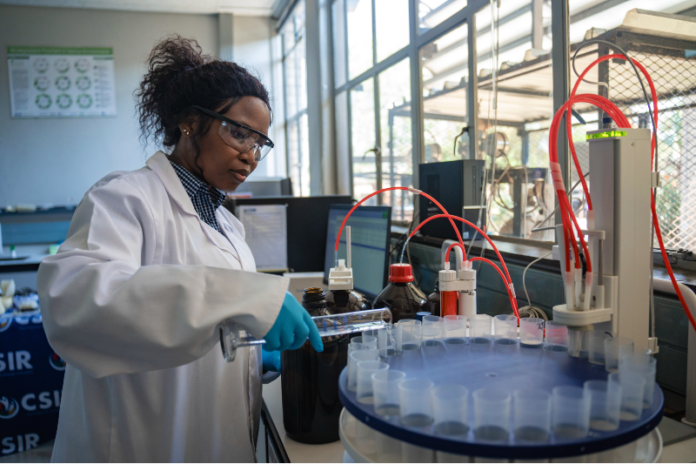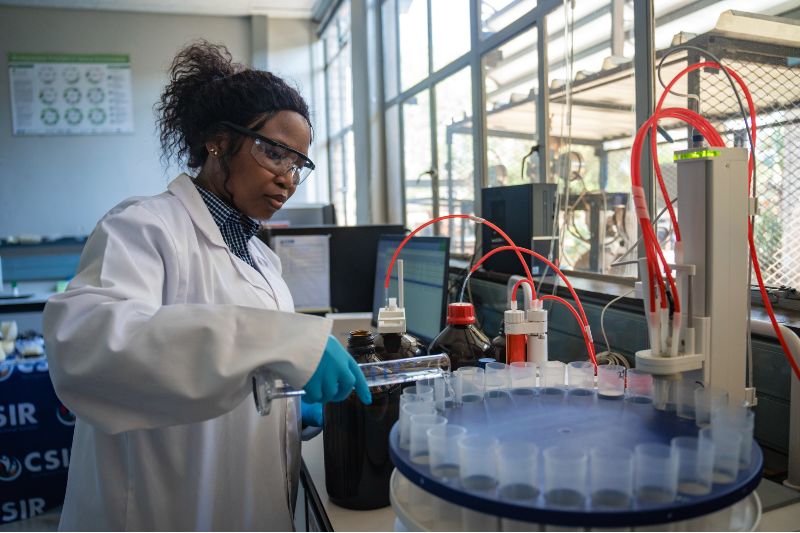
By Omboki Monayo
In the heart of Pretoria lies South Africa’s most prominent laboratory complex, bustling with scientists, engineers, and researchers dedicated to enhancing the quality of life for South Africans. Their collective mission at this sprawling campus is the identification and activation of ways to achieve sustainability.
For nearly 80 years, the Council for Scientific and Industrial Research (CSIR) has been the backbone of innovations spanning various sectors like agriculture, energy, health care, and mining, to name a few.
Recently, the CSIR, which has a solid reputation as Africa’s premier science and technology research organization, rolled out a series of game-changing solutions to confront the escalating issue of plastic pollution. CSIR’s Chief Executive Officer, Thulani Dlamini, in a conversation with the United Nations Environment Programme (UNEP), expressed, “Everything we do at CSIR should propel the betterment of South Africans’ lives. That’s our benchmark for genuine impact.”
Every year more than 400 million tons of plastic are produced globally and an estimated 19–23 million tons end up in lakes, rivers, and seas. However, less than 10% of the world’s annual plastic production is recycled. In Africa, which produces only 5% and consumes 4% of global plastic, the growing population and urbanization are driving an increase in single-use plastic, heightening environmental pollution and health threats.
Plastic pollution in Africa adversely impacts both human health and ecosystems. Contaminated fresh water sources lead to microplastic ingestion through drinking water and seafood, introducing potential health risks such as endocrine disruption and increased cancer chances. Additionally, improper plastic waste disposal in many African locations breeds disease-carrying mosquitoes, and burning plastic releases harmful respiratory pollutants.
The degradation of essential ecosystem services, such as water purification and disease regulation, further affects health and undermines local economies. While about 30 African nations have banned single-use plastic bags, more effective policy implementation and monitoring are required. The emerging United Nations treaty on Plastic Pollution seeks to address these challenges, emphasizing international cooperation, strengthening waste management systems, and promoting sustainable practices for better health and environmental protection.

In recognition of CSIR’s relentless endeavors against plastic pollution, The United Nations honored them with the 2023 Champion of the Earth for Science and Innovation accolade, one of the UN’s most prestigious environmental awards.
The UNEP Champions of the Earth award, the UN’s highest environmental accolade, celebrates trailblazers making transformative environmental impacts. It is also buttressed by the #BeatPollution Initiative, which aims to mitigate pollution’s widespread effects on society, emphasizing pollution’s impact on climate, biodiversity, and human health. The campaign advocates for a cleaner planet, safeguarding future generations.
UNEP’s Executive Director, Inger Andersen, praised CSIR’s role, stating, “The remarkable initiatives by CSIR underscore the importance of innovation in carving a sustainable path for humanity.”
A Historical Perspective on CSIR’s Contributions
Post-World War II, understanding the importance of scientific research for economic rejuvenation, CSIR was founded in 1945 by a legislative act. Over the years, CSIR has significantly influenced policy-making through robust evidence-based research.
One of their significant achievements in 2022 involved utilizing the ‘Pathways’ software, developed by Pew Charitable Trusts and the University of Oxford. The software’s insights led to a comprehensive report highlighting the potential for South Africa to cut plastic pollution by a staggering 63% by 2040 through holistic interventions.
As Dlamini articulated, “Effectively battling plastic pollution demands a multipronged approach, incorporating both upstream and downstream strategies.”
Addressing the Plastic Crisis
Plastic, while being a boon in various sectors, is a major environmental concern, contributing to 3.4% of global greenhouse gas emissions. CSIR’s data projects that without prompt interventions, plastic pollution in South Africa might soar to 865,000 tonnes by 2040, a significant jump from 491,000 tonnes in 2020.
CSIR’s answer to this crisis is the creation of compostable plastic. Notably, products from CSIR’s innovative plastic alternative can disintegrate within 180 days or even transform into compost within 90 days, leaving no harmful residues.
Adding to their accolades, CSIR, backed by the United Nations Industrial Development Organization and the Japanese government, boasts of being the sole African laboratory capable of validating the biodegradability of plastics. This initiative ensures transparency and helps in identifying new problematic materials. Furthermore, CSIR’s #SolvePlasticsAfrica Hub, an open-source digital platform, promotes pan-African collaboration in addressing plastic pollution.
Dlamini expressed the institute’s ethos, saying, “Our aim isn’t limited to research. We are driven to see our innovations make a tangible difference.”
With a formidable team of 2,400, including 1,600 scientists and researchers, CSIR’s breakthroughs aren’t limited to plastics. Their revolutionary research ranges from developing stem cell technology, which could potentially treat prevalent African diseases, to creating tools for South Africa’s forest management.
Maya Jacob John, a leading researcher at CSIR, summarized their vision, “Beyond just material creation, our long-term aim is to tackle pressing issues, including plastic pollution.”













